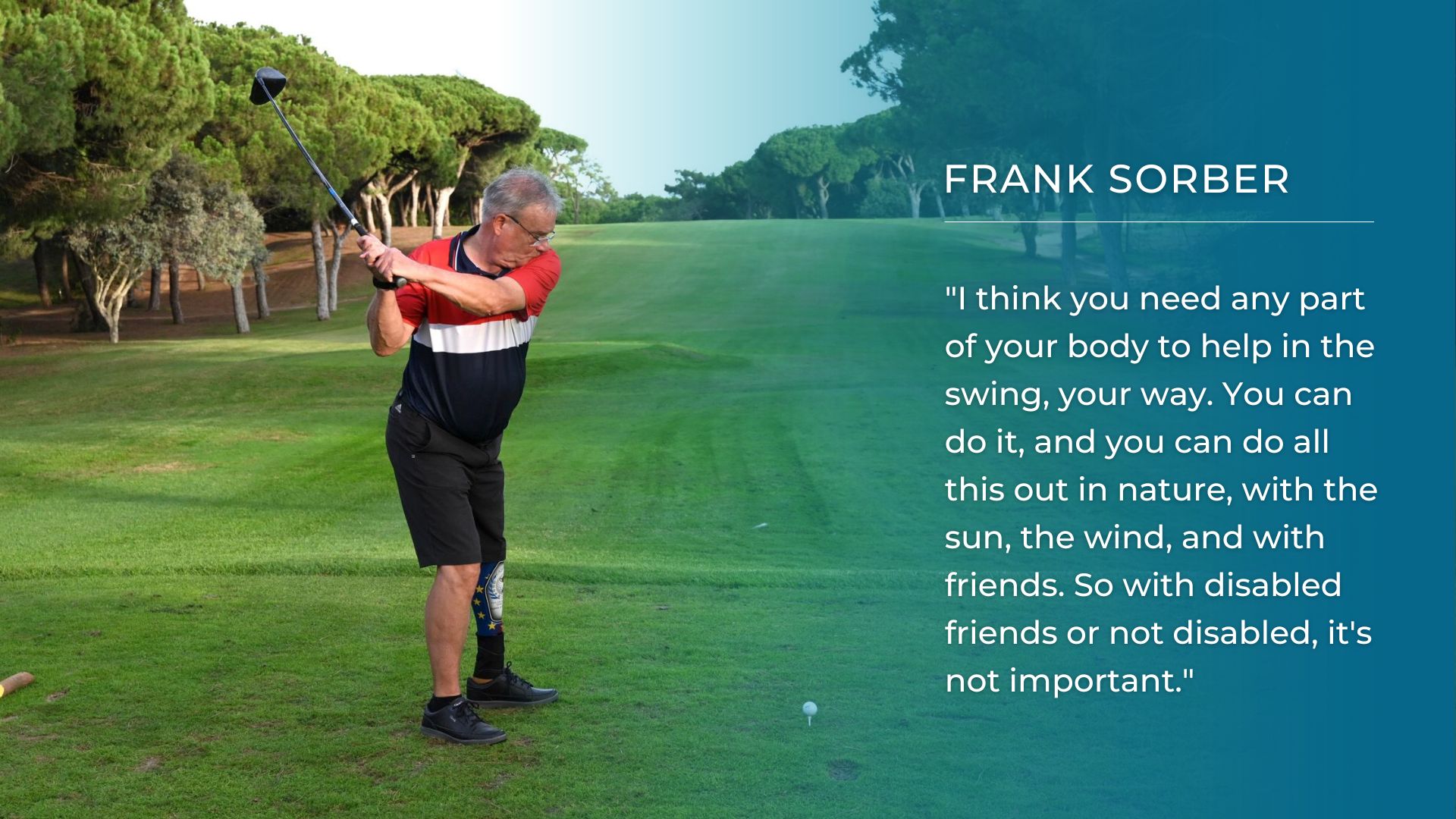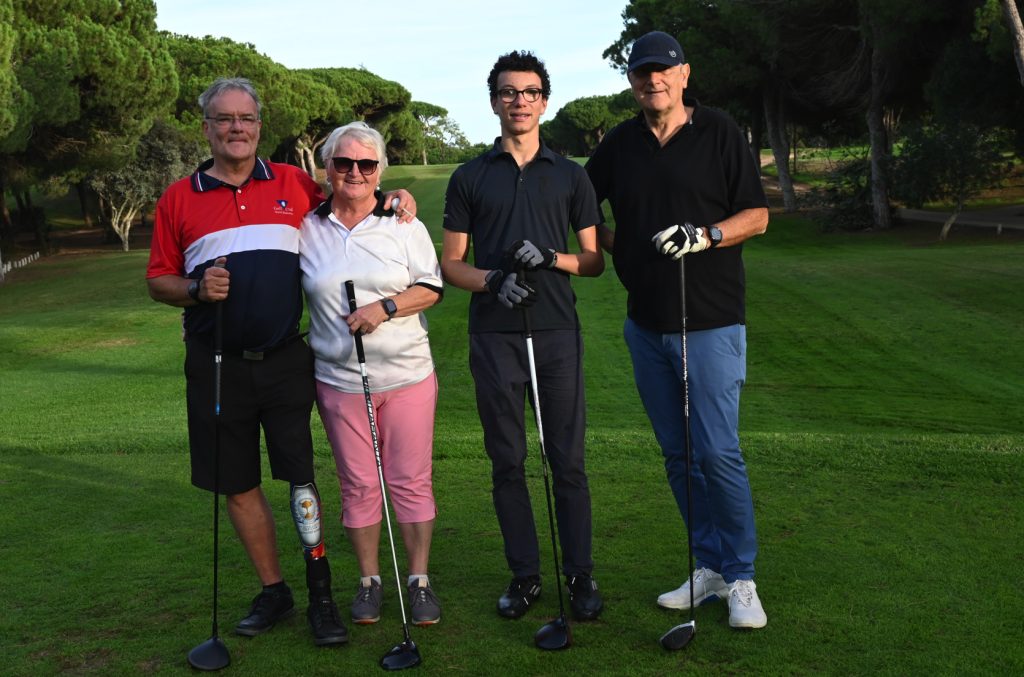
In 1999, Frank Sorber lost his left leg after a motor accident. Four months later he drove a car 1,200km around Ireland. The 62 year-old long time student of the Japanese martial art of Aikido has a mindset of living in the present, enjoying seeking what is here now. He seems to like what he finds. Today, much of this happens to be on the golf course, a new home discovered when searching for his next sport after the accident.
Frank realised that his favoured sport of Aikido, an exercise in speed, agility and strength using long wooden swords and sticks to fight, would no longer be a realistic option with a missing leg, so he was eager to find a way to improve his strength and mobility.
Swimming and nine-pin bowling were tried and he gradually lengthened his walking distances, but eight years after the accident Frank went to lunch one day at a restaurant on a golf course. There, he saw on the wall in front of him a large (‘A2’-size) photograph of an older man, a golfer, playing what looked like a great shot out of a bunker. This man had the one leg, like Frank had one leg. His mind started working.
Frank’s personality, his behaviour and what he says, exhibit a calm positivity to concentrate on what is ahead, not what’s been before. He is not sure exactly how much Aikido helped here but he is convinced that it did, perhaps significantly. The name can be translated as ‘the way of harmonious spirit’, and its founder Morihei Ueshiba talks of it as ‘victory over oneself’. The art is more about defending yourself than attacking, but advancing with positives: the past seems to be irrelevant.
“Ten years before the accident I was beginning to learn Aikido,” explains Frank. “It’s about defending yourself. It gives you a good feeling for your body and you learn to have a good feeling in your head, you learn that what is over is over. Of course, I also don’t know what the future brings, but I can choose to live in the moment, and look to make a good future, that’s all I can do. If you remember this, you can look forward more easily.”
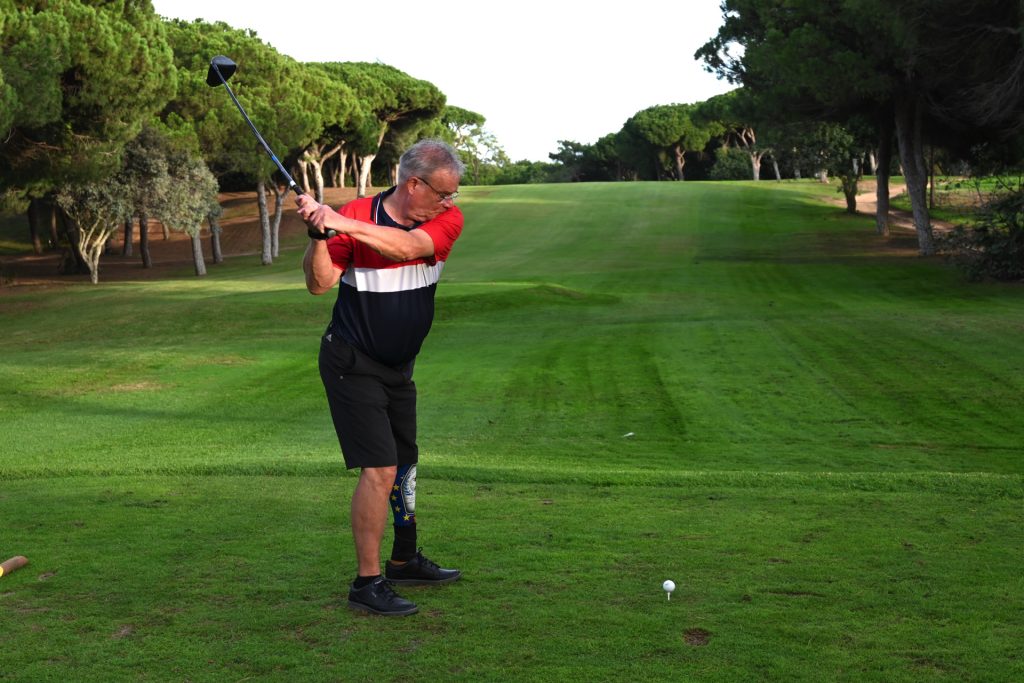
Frank was born in Erfurt in the former German Democratic Republic (GDR). In 1989, before the fall of the Berlin Wall, he left the GDR with his wife and their two children and since then has lived in Bad Neustadt, a small town in northern Bavaria.
A decade later In January 1999, Frank was driving along when he skidded on a patch of ice into a field. Unhurt, he called a friend who said he would come along and help with the damaged car. Frank stood and waited in the fresh air. A little later another car happened to skid on the same ice surface and also crashed into the field exactly where Frank was standing. His left leg was caught between the vehicles in the collision and was so badly injured that it had to be amputated above the knee. Frank also suffered fractures to a cervical vertebra and a lumbar vertebra.
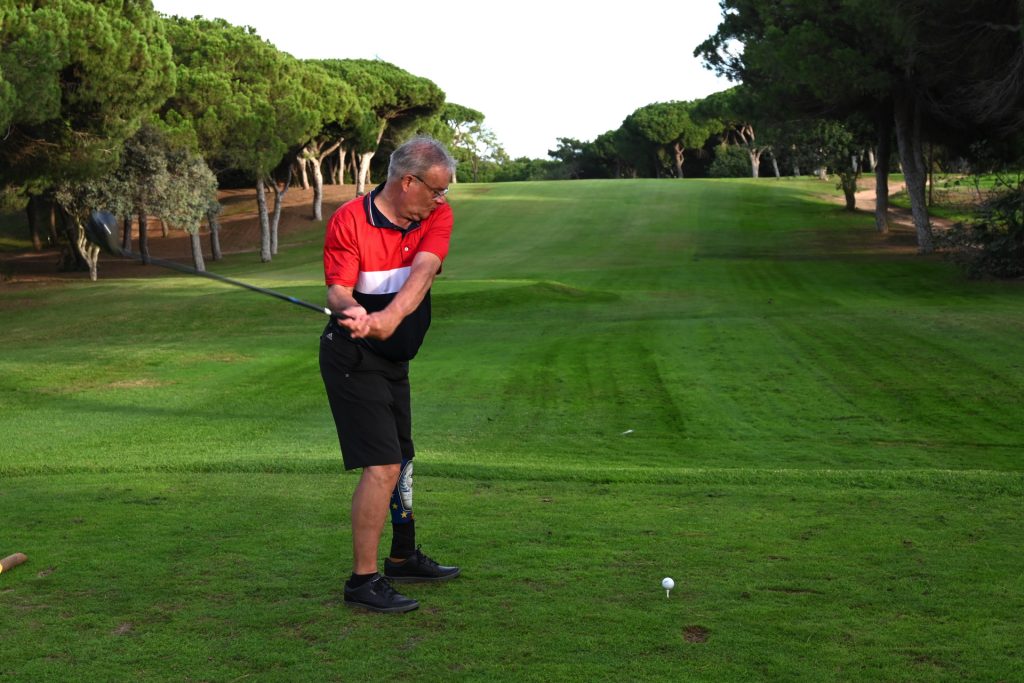
He says: “I didn’t feel like I had the worst time. I had one day which was the worst, in the hospital after a week. The doctor asked me to stand up and I tried it but it didn’t work. I had just had an eight-hour operation for the back and the amputation, and three days in the coma. So I didn’t find it possible to stand and stay up. But this was a moment, and that was my one bad day.
“So from this point, I decided to think forward. ‘What can I do next time to stay up?’ That was really important, to see what I could do that would be better the next time.”
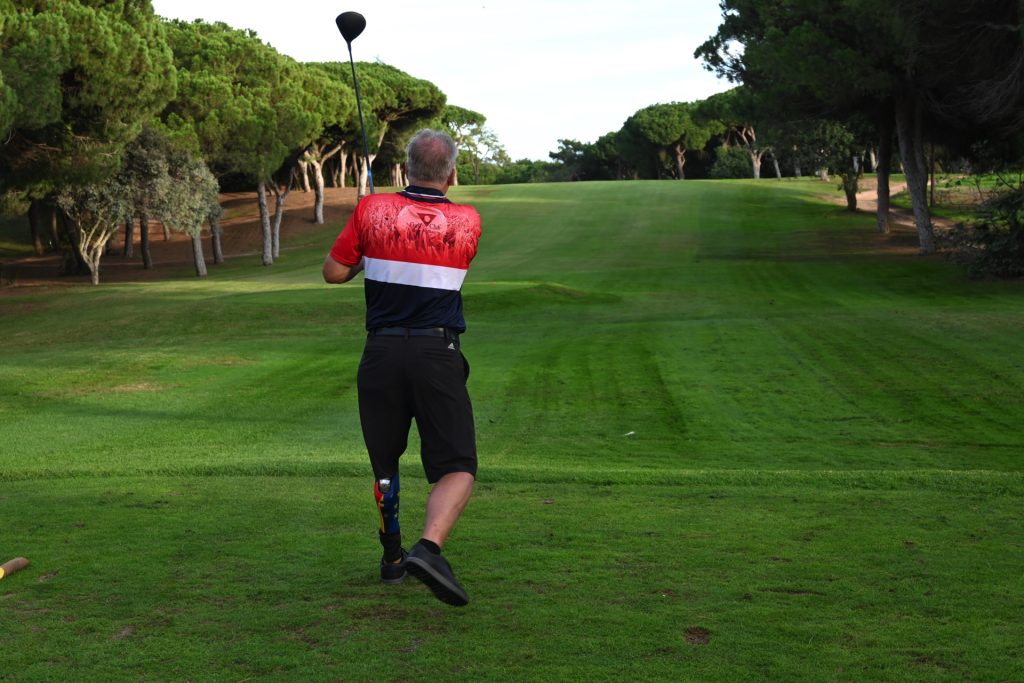
That was all in January. He agrees that his decision to drive around Ireland in May was a good way of “getting back on the horse” after a car accident, getting used to the road and traffic again, while enjoying the beauty of the countryside and the culture that Ireland offers the visitor.
Frank refuses to say that the rehabilitation was difficult, but the reality is it is never easy and painless, physically or mentally. The Aikido calmness was surely in play, the martial art being one great joy he knew he would have to give up, though he prized its teaching.
“I wasn’t interested in being a master of Aikido, but I was absorbed in the process. I liked both the sporting and exercise part and the spiritual element,” he explains. “I used to go two times a week for training. But it was never about searching for a perfect technique. That was not my point.”
This student would also choose to be stoical about giving up his job in a carrier company. However, he was looking for a new challenge, and it all happened one lunchtime.
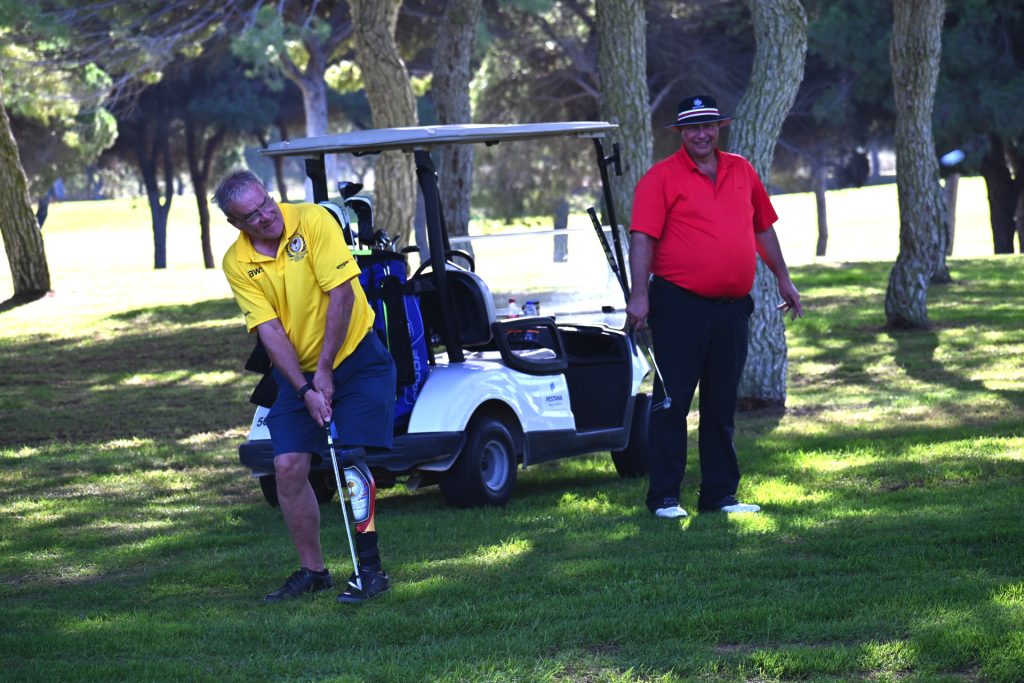
Some months after seeing the picture of the man with the amputated leg, Frank would meet the club’s vice president in the restaurant of the Maria Bildhausen monastery. He was thus invited to an introductory learning course at the club which had been founded a few years earlier. The facility, which was built on the monastery’s no longer used agricultural land, was given an 18-hole course and a public six-hole course. This shorter course, with a length of 2,000 metres, was particularly suitable for Frank. It helped him keep his body fit, especially strengthening his legs and back, as he played.
Frank learned the game well, including all the moves in the golf swing and today is a competitive player off a handicap of 19.3, while Golf Club Maria Bildhausen has developed alongside Frank, today presenting a full 18-hole championship course of which he is proud to be a member.
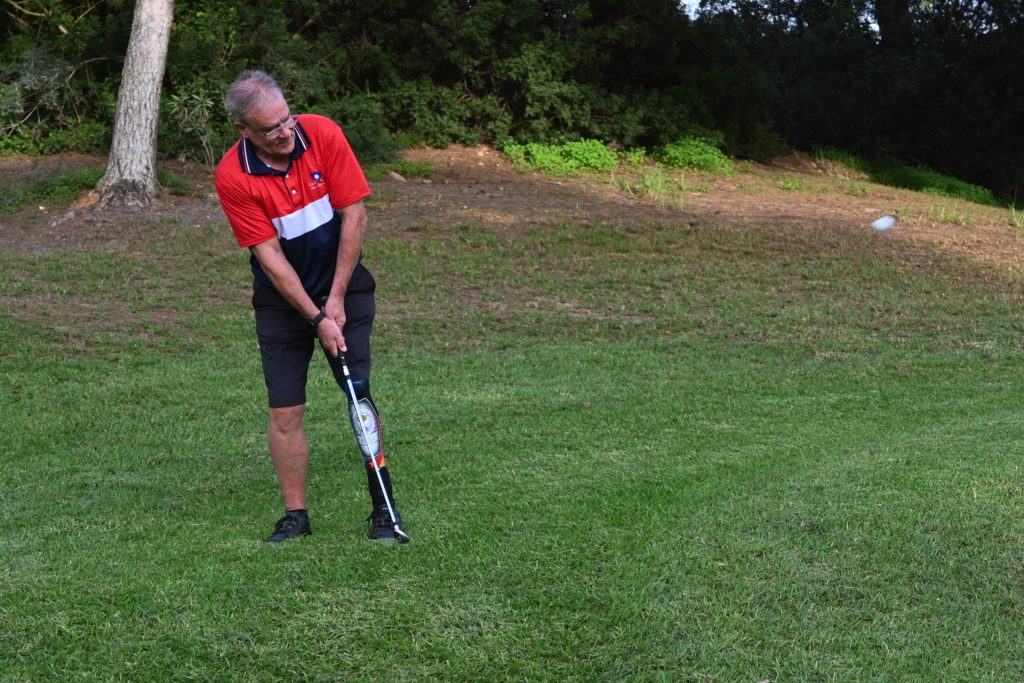
He tells us that the club’s owners, Rudi Weigand and his son Marko, are passionate about the club and have invested wisely, including in converting the site’s buildings well to make them accessible for people with a disability; the latest achievement being an advanced indoor golf facility to learn and practise your golf.
The whole atmosphere of the club is appreciated by Frank; he is very thankful to the club’s coaches for helping him with his “special style of golf swing”, and his fellow members for welcoming him so well to the game. Meanwhile, he believes everything about the exercise of golf is ideal for him.
“Maybe, if you see it, my leg, you think it is an important thing. But if I say, ‘Okay, I lost it’, and now I have a prosthetic so I can walk, and then I find I can do most things. I can walk in the wintertime if it isn’t hot, I can even walk our full golf course, 10 kilometres. So it is okay. I know other people who have two legs and they can’t walk 10 kilometres, you know?”
In the summer, it can be warmer causing more discomfort so Frank tends to play nine holes walking and nine in a buggy. Meanwhile, he was delighted to become the contact point for any person with a disability in the region to come along and try, have a lesson with the club pro and play some holes with Frank. Frank also gives back to the club which welcomed him by working as a marshal in some of the club competitions.
“Yes, I think golf is one of the perfect sports for disabilities. We can play with everyone, from eight years old to 80. You can have a disability with leg, with arm, from a wheelchair, blind, whatever. And we can be on the same level. If I have a handicap of 20 and the other player has a handicap of 20, we are the same. That’s the great thing about golf, I think.
“And a big thing is, if I hadn’t had an accident, I believe I would never have played golf and never met all these friends around Europe or the United States. Sometimes it feels good that I had it [the accident] but who really knows.”
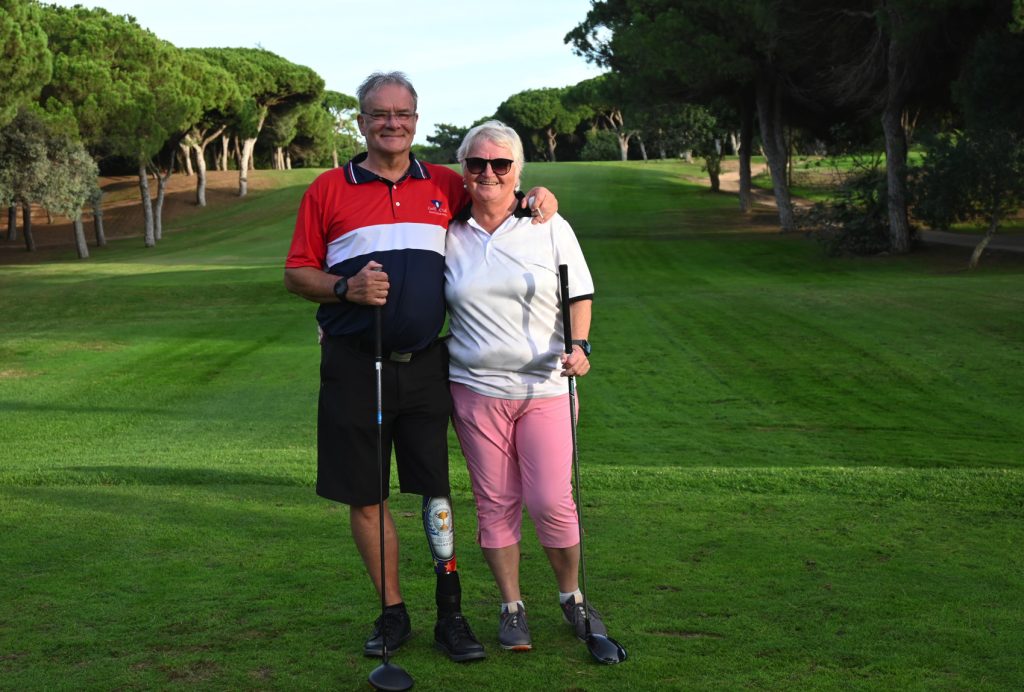
Around five years after Frank started, he was delighted that his wife Elisabeth also took some lessons and then joined him on the fairways. “Elisabeth is a very special and important person for me of course,” Frank says. “She helped me so much when I had had the injury and now it’s wonderful that we are now enjoying golf together. Elisabeth travels with me to all the tournaments and is my greatest supporter!”
The couple love taking golf holidays together and husband and wife are part of an informal social golf group at the club, playing together in good spirit and sharing a few actual spirits and prosecco as refreshments half-way round. Frank also enjoys playing between 15 to 20 club tournaments each season to keep up his competitive focus.
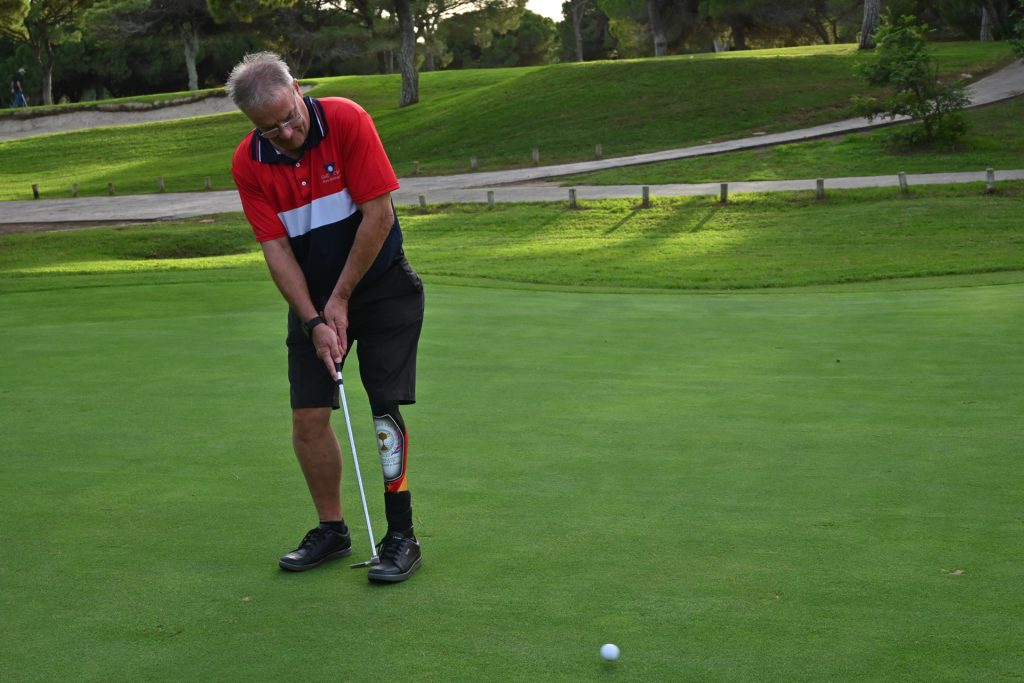
“Golf is now a very important part of my life. It gave me the possibility to travel in a lot of countries in Europe,” he explains. Frank has been playing in EDGA tournaments for 10 years, first playing in the Czech Republic, and he reckons he has played in around 25 of these, in The Netherlands, France, Portugal and of course Germany.
He loves the EDGA scene, saying: “Nobody says, ‘Oh my goodness, I lost my leg’, or, ‘My goodness, I sit in a wheelchair’. No, it’s, “I sit in the wheelchair, yes. Let’s play golf’.
“It’s a lot of positive energy, you know?”
Playing golf with a prosthetic leg is a challenge, Frank accepts this, but he also embraces that challenge head on.
“For sure. You have to move your body and I think you need any part of your body to help in the swing, your way. You can do it, and you can do all this out in nature. You can do it with the sun, the wind, and you can do it with friends. So with disabled friends or not disabled, it’s not important.”
Meanwhile, this positive energy is in the present, the next shot.
“So my motto is, ‘the next one, the next shot will be the best one of the day’. If I had a bad shot, okay, I had the bad shot. It’s okay. Everybody has bad shots and I think the next shot is the best of the day. I stay positive.”
Frank is excited that he will be taking part in an independent team event called the Cairns Cup (starting late July) near Detroit. Frank was selected to play for Europe against the USA as one of a range of golfers with a disability to take part in the event taking place at Cherry Creek Golf Club, Michigan. Just one of the events he is looking forward to this summer.
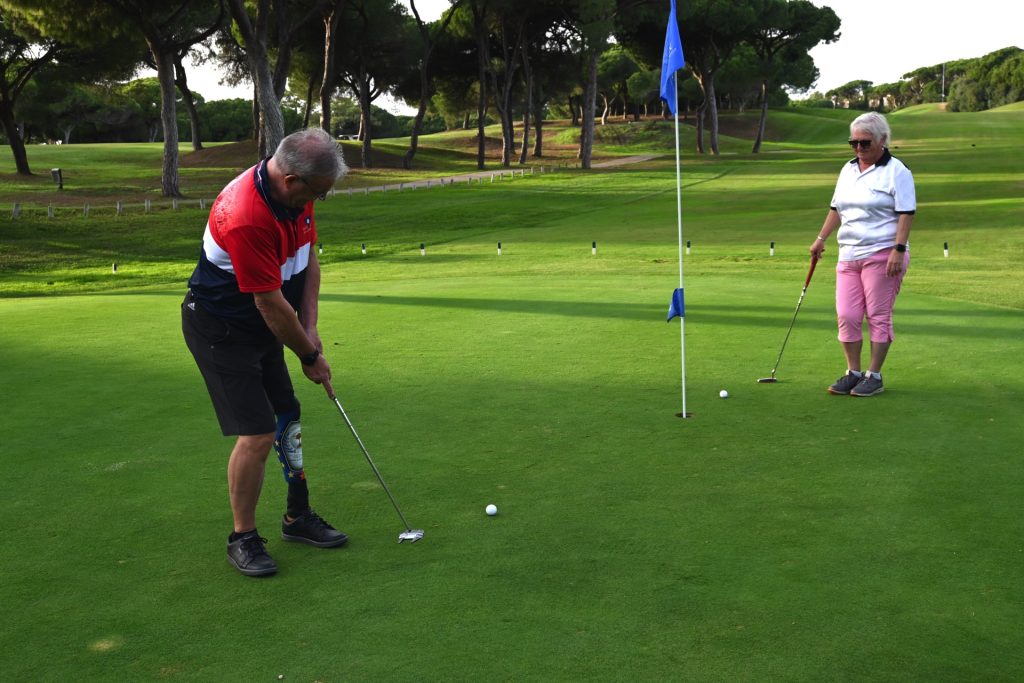
When Frank meets people with a disability at the hospital, or they hear about opportunities to play at the club, he tries to ensure that he and fellow club members offer the same welcome and encouragement he received when starting. On these occasions he will hit some shots in golf shorts rather than full-length trousers. You soon see why.
“We show them how they have to hit for longer distances and also for chipping and for putting. We show them our course so that they may be interested to play golf themselves. They then share their experience with others. And I go with shorts… They see the leg and they all think, ‘Whoa!’. And most will think, ‘Hey, he’s with one leg and he can do it, so I can do it too’.”
Through these trial sessions Frank estimates he has been able to get around 10 people with disabilities to start playing golf at the club so far; some becoming members there. Frank hopes to organise an ‘Inclusions Cup’ in May, 2024, at the club. The day before there will be an afternoon specially for people with disabilities where they can try out golf for themselves. There is lots to put together to make this happen but Frank is eager to see this progress.
Frank is not the first golfer with a disability to want to put something back into the game. He knows the value of encouraging others as he was also encouraged. He has substituted being attacked with sticks to handing a new player a golf stick and saying, ‘Give this a try, it can help more than you think’. Aikido has taught Frank that there is no point worrying about the past, or fearing for the future, it’s about living well in the present. A focus on golf only reinforces that feeling. It is all we can do, says Frank, and by doing so we are more likely to thrive and appreciate what we encounter in our challenging lives.
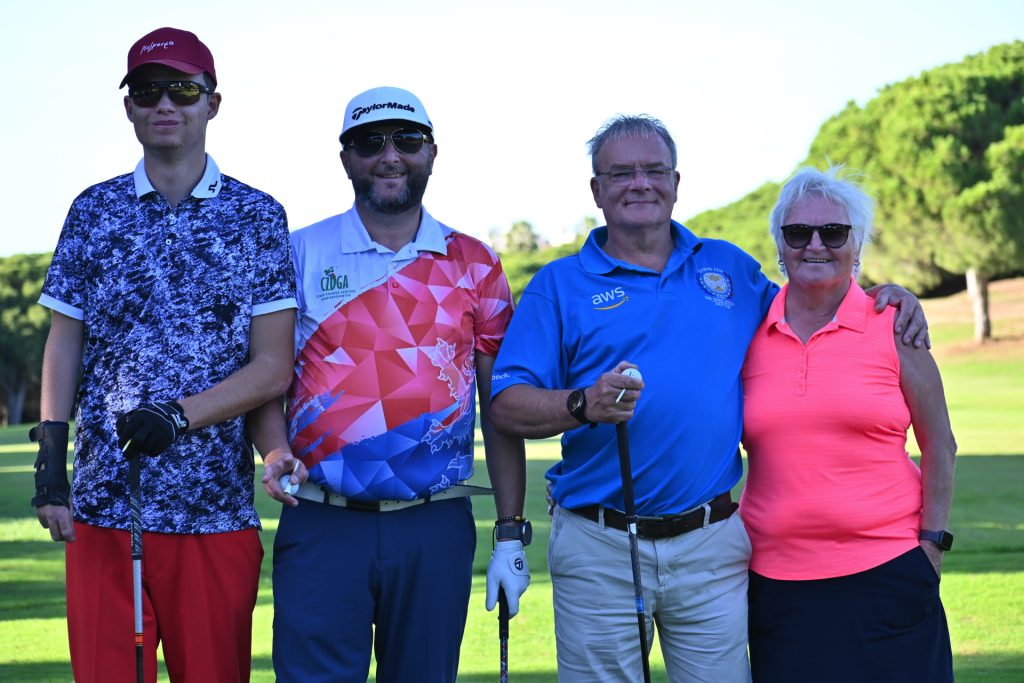
NB: When using any EDGA media, please comply with our copyright conditions


